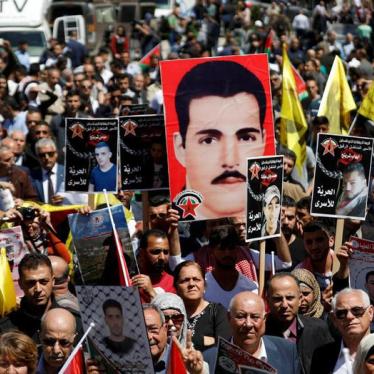(New York) - Many governments' policies toward migrants worldwide expose them to human rights abuses including labor exploitation, inadequate access to health care, and prolonged detention in poor, overcrowded conditions, Human Rights Watch said today in advance of International Migrants Day, on December 18, 2009.
A 25-page roundup of Human Rights Watch reporting on violations of migrants' rights this year, "Slow Movement: Protection of Migrants' Rights in 2009," includes coverage of China, Cuba, Egypt, France, Greece, Israel, Italy, Jordan, Kazakhstan, Kuwait, Lebanon, Libya, Malaysia, Russia, Saudi Arabia, South Africa, Thailand, the United Arab Emirates, and the United States.
"Governments seem to forget that when men, women, and children migrate, they don't leave their rights at home," said Nisha Varia, senior researcher in the Women's Rights Division of Human Rights Watch. "Instead of protecting people who already are at special risk of abuse, many governments further marginalize migrants, punish them, or push access to services out of reach."
Research in Greece, Italy, Libya, Egypt, and Israel showed harsh policies toward arriving migrants, including lack of adequate screening to determine who is a refugee, arbitrary and indefinite detention, returning persons to countries where they risk abuse, and detention of children with adults. Aggressive policies to thwart migrants when they try to cross borders can be lethal. Since May, Egyptian border guards have killed at least 17 migrants trying to cross into Israel.
Both documented and undocumented migrants may face abuse or discrimination in their host cities and countries. Human Rights Watch has investigated pervasive mistreatment of migrant domestic workers and construction workers in the Middle East and Russia. Cheated by unscrupulous brokers and employers, these workers often told of excessive hours, unpaid wages, and confiscation of passports. In the worst cases, their situations amounted to forced labor and trafficking.
"Migrants form the backbone of many economies, performing the labor and services that people in their host countries depend on but won't do themselves," Varia said. "Instead of getting respect and the freedom and wages they are owed, they are treated as security threats, and in general, as undesirables to be pushed out of sight."
Those apprehended for immigration offenses often face disproportionate punishments or prolonged detention in poor conditions. Human Rights Watch showed how the United States deports large numbers of documented migrants for nonviolent offenses with serious consequences for family unity and fails to provide adequate health care to migrants in detention. Immigration violations are sometimes treated as serious crimes, as in Malaysia, where punishments include imprisonment and caning. The fear of arrest and deportation also means that migrants may endure exploitative work conditions or avoid approaching authorities to report abuse.
"Governments have a right to control their borders, but they need to do so in a way that protects human rights," Varia said. "Migrants who are abused are supposed to have access to legal remedies, regardless of their immigration status."
Government attempts to control migrant populations within their territory often include discriminatory policies that broadly restrict migrants' freedom of movement for no legitimate purpose, Human Rights Watch said. For example, several provinces in Thailand require migrant workers be confined to their workplaces or homes at night and prohibit them from traveling within the province. In Malaysia, the government has condoned vigilante-style monitoring of migrants by a civilian group. Migration can increase the risk of infection with HIV, tuberculosis (TB) or flu, but discrimination against migrants can impede their access to care.
Human Rights Watch called on governments to make stronger commitments to migrants' rights in 2010, including ratifying the International Covenant on the Rights of All Migrant Workers and Their Families. The group also urged governments to:
- Reform immigration policies to facilitate documented migration that protects migrants' rights, and to clamp down on intermediaries who deceive migrants or charge unlawful fees that leave migrants indebted and more vulnerable to exploitation;
- Screen interdicted migrants, new arrivals, and migrants in detention in accordance with international standards, including identifying asylum seekers, trafficking victims, and other vulnerable people, and ensuring that unaccompanied children are treated according to their best interests;
- Ensure access to a core minimum of health services regardless of citizenship or social origin, and repeal discriminatory provisions mandating automatic deportation of migrants living with HIV;
- Improve labor standards and enforcement in accordance with international standards, including equal protection of domestic workers, and strengthen inspection mechanisms to ensure regular payment of wages and decent working conditions for migrants;
- Investigate abuse and killings of migrants, whether by private citizens or government authorities, and prosecute fully through the relevant national laws while ensuring protection for migrants against retaliation. Investigations into abuse should be carried out irrespective of migrants' immigration or contractual status.






